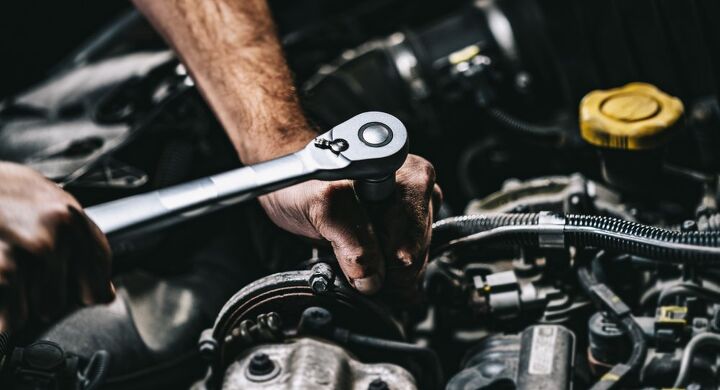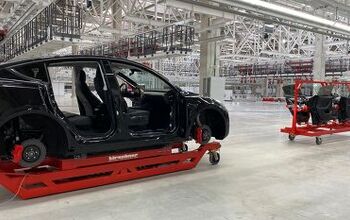Right-to-Repair Movement Gets Federal Attention

While the right-to-repair movement is fighting a national battle, the brunt of the action has been taking place on America’s coasts. Consumer activists are taking on multinational corporations that don’t want you to modify your mobile devices, affix aftermarket components to your vehicle, or have complete access to the data that’s amassed by the staggering number of products that are needlessly networked to the internet. After years of petitioning the government, often while arguing with high-paid lobbyists, the group achieved a major victory in Massachusetts in 2020. Voters decided that automakers should not be allowed to withhold information from the vehicle’s owner or use it as a way to prohibit them from taking their car into independent repair shops (rather than manufacturer-certified service centers) or tinkering with it themselves.
Now the federal government is getting involved. Joe Biden has signed an executive order that effectively forces the Federal Trade Commission (FTC) to take regulatory action that would settle the matter. But we don’t really know if that’s going to lead to a market where customers are free to treat their property (and private data) as they wish, one where the manufacturer holds all the cards, or simply result in a regulatory minefield displeasing all parties.
Officially signed on July 9th, Biden’s order does come with a slew of recommendations that seem to favor the right-to-repair movement’s cause. Included among them include directions to limit the industry from restricting consumers’ ability to use independent repair shops and establish rules that would prohibit anticompetitive behavior. It does put an overwhelming amount of responsibility on the FTC, which some consumer advocates remain distrustful of. But the general trajectory seems like this will result in a substantial win for the movement.
“No one’s got a bigger megaphone than the administration, and so them bringing more attention to the automotive right to repair issue is really important,” Justin Rzepka, executive director of the Consumer Access to Repair Coalition, a group of independent auto parts and repair companies, associations and insurers, told Automotive News.
“It’s hard to argue this doesn’t help our side, bringing more attention to this issue,” he added.
From AN:
The commission — led by Chairman Lina Khan and flanked by two Democratic and two Republican commissioners — is scheduled to meet Wednesday, July 21, to vote on whether to issue a new policy statement on repair restrictions following the FTC’s report to Congress on the topic.
The report issued in May catalogs the types of repair restrictions used by manufacturers in the auto industry and other sectors, summarizing explanations for those restrictions as well as repair advocates’ arguments against them.
It also suggests solutions to complaints across a range of consumer products — including vehicles, cellphones and farm equipment — either through state or federal law, voluntary cooperation by industry or new FTC regulations.
Small businessman turned right-to-repair figurehead Louis Rossman has been habitually skeptical of regulatory efforts — routinely providing examples where the government fails to enforce existing consumer protection or antitrust laws. But even he suggested that some of the FTC’s newer hires looked to be promising allies for the movement, including Khan. Though he still believes it’s up to citizens to remind those in power to act in accordance with their stated beliefs and press for desired outcomes.
From Rossman’s perspective, the executive order creates an opening for real progress to be made and that’s enough after years of right-to-repair fighting losing battles against industry lobbyists and risk-averse politicians. But he doesn’t believe the battle is anywhere near finished.
“Of course I am cynical,” he said earlier this month. “I am always cynical. I will always remain cynical. Which is precisely why I have been doing a lot of work engaging with members of the FTC that are responsible for making these types of rules — through my antitrust attorney that I retained several months ago — to make sure that when they start writing these rules that repair people have a seat at the table so that this doesn’t wind up being a bunch of diluted, watered-down bullshit.”
“We are very far from done. There is a lot of work to do.”
Most of that work will be done in opposition to the Alliance for Automotive Innovation (AAI) — the largest automotive trade group in the world — and other corporate lobbies that are attempting to keep Massachusetts’ right-to-repair laws from catching on in other parts of the country. The AAI has previously stated that the automotive industry effectively knows better than consumers on how to fix their cars and provide meaningful OTA updates — which are allegedly dependent upon manufacturers’ ability to control the data. It also believes the automotive industry’s repair options are robust compared to other sectors and has called into question the very concept of vehicle ownership moving ahead. Automotive lobbies have also alleged that Massachusetts has violated federal laws and has exposed customers to new cybersecurity risks.
Intermixed with all of this is a coalition of groups, both supporting and opposing the right-to-repair movement, that would prefer regulatory action be decided upon by Congress. Some are finding dictums by the White House and/or Federal Trace Commission unsavory, believing they set a bad precedent for American governance. Others are just happy there’s a ball in play at the federal level.
[Image: Alexander Kirch/Shutterstock]

A staunch consumer advocate tracking industry trends and regulation. Before joining TTAC, Matt spent a decade working for marketing and research firms based in NYC. Clients included several of the world’s largest automakers, global tire brands, and aftermarket part suppliers. Dissatisfied with the corporate world and resentful of having to wear suits everyday, he pivoted to writing about cars. Since then, that man has become an ardent supporter of the right-to-repair movement, been interviewed on the auto industry by national radio broadcasts, driven more rental cars than anyone ever should, participated in amateur rallying events, and received the requisite minimum training as sanctioned by the SCCA. Handy with a wrench, Matt grew up surrounded by Detroit auto workers and managed to get a pizza delivery job before he was legally eligible. He later found himself driving box trucks through Manhattan, guaranteeing future sympathy for actual truckers. He continues to conduct research pertaining to the automotive sector as an independent contractor and has since moved back to his native Michigan, closer to where the cars are born. A contrarian, Matt claims to prefer understeer — stating that front and all-wheel drive vehicles cater best to his driving style.
More by Matt Posky
Latest Car Reviews
Read moreLatest Product Reviews
Read moreRecent Comments
- SCE to AUX Norway is in Europe, and Tesla is an American automaker - no problems there.I wouldn't use Ford as the bellwether.https://www.reuters.com/business/autos-transportation/tesla-extends-lead-norway-evs-take-record-82-market-share-2024-01-02/https://elbil.no/english/norwegian-ev-policy/
- Steve Biro If the U.S. government wants to talk about banning all connected cars - or at least the collection and sharing of information from said vehicles - I’m all ears. Otherwise, don’t waste my time.
- Ajla Both parties are in favor of banning Chinese vehicles so I don't see how it won't happen in the next year.
- Add Lightness I don't waste a lot of time watching nothing much happening by watching the YouTube 6 minute highlights.
- MrIcky from my rental fleet experience, id rather drive one of these than a camry.


































Comments
Join the conversation
Say what you will about the Alliance for Automotive Innovation, but when they tell you that I am unqualified to change my front spindles without screwing up the new bearings, they are right. :-)
Massachusetts fought for and won the right to repair? Sounds Marxist to me. You're better off just trusting the Capitalists. Let them provide you the freedom you desire (;